Our addiction to growth will be our withering
The societal addiction to growth and its monetisation of education will be humanity's inflection point.

The writing of this article came about through the Past, Present and Future of Innovation course as part of my BCII degree. In envisioning new futures for secondary school education as our case study it was essential to utilise causal layered analysis in understanding how the ongoing problems that we face today can be traced through the myths and metaphors (preconceptions, collective archetypes and the subconscious dimension) which form the basis of our "reality".
Metaphors paint a subtle, complex and nuanced landscape, they indirectly borrow an essential meaning from another mental landscape. While we can describe reality through literal meanings, we are ultimately limited by the limits of our semantics (language) and therefore there is no literal truth, the meaning of everything cannot possibly be communicated in its entirety; as denoted in William Ockham's nominalism, where only specific things exist and the categories we invent are mere words that point at these particulars.
These meanings we ascribe to describing reality help shape our values, materialising our worldview. In turn, these worldviews we hold form the cause of our issues, which the social sciences attempt to understand through studying the short-term and long-term social, economic and cultural factors. Finally, this results in what we can observe: that which is visible, audible and experiential. Therefore, to create fundamental social change is to change the stories, the meanings of the metaphors and myths that we ascribe to make sense of the reality around us.
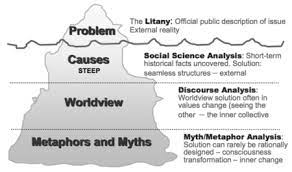
Change is not directly created through individuals but through the collective. Yuval Noah Harrari dissects this in his book "Sapiens", where he evidences that much of history is forged through collective story-telling. The ability to convince everyone of a shared belief holds immense power as this enables millions of strangers to co-operate towards a single goal.
"Imagine how difficult it would have been to create states, or churches or legal systems if we could only speak of things that really exist, such rivers, trees and lions" ~ pg 35, Sapiens.
The difficulty does not lie in telling the story, but in convincing everyone else of it. As such, change is most effective when we can elicit powerful story-telling and change our collective values. By shifting our myths and metaphors, we can transform society on a fundamental level, our worldviews, and systemic flaws and arrive at original solutions. In the real world, the impact of story-telling has primarily been exacerbated through film and TV. Take the Matrix, for example, with the symbolic act of Morpheus giving Neo the choice of either a red pill which would activate a trace program that would allow the Nebuchadnezzar Crew to extract him from the matrix or a blue pill which would keep Neo believing as he wishes. Now, realise for a fact that the Matrix is not real. There is no Neo or Morpheus in the real world it is merely a story materialised into a series of moving pictures and sounds. But yet, we still use the Matrix to articulate our experiences (see simulation theory) and utilise the metaphor of the red and blue pill to denote the action of uncovering the truth.
Another popular example is George Orwell's animal farm, a beast fable about a group of animals who overthrow their human farmer to create a society where animals can be free, equal and happy, only to be betrayed by a Pig named Napolean that throws the farm into just as bad of a state as before. Again, Orwell's animal farm is not real. Yet, it is used as a role model kind of example that explores how human beings, even with the best intentions, can let their demons manifest when they take hold of power (leading to all sorts of corruption and betrayal of the revolutionist ideal). Such examples of fiction including 1984 and Maze Runner can express ideas that may be too subtle for us to comprehend but are nevertheless fundamental in how we shape our understanding of our ever-changing world. As such, even the most "rationally minded" person cannot escape the power of story-telling and metaphors, for it is the basis of our perception.
(basically, appreciate creative writing for more than what you think it's worth)
The curse of GDP
In understanding how we got to this point, we must understand the basic economic models that underpin our understanding of growth.
Gross domestic product (GDP) is the total cost of all goods and services sold in an economy each year. The modern concept of GDP we know of was developed in 1934 by Charles Davenant for a U.S. Congress report, in which he also warned that GDP is an oversimplistic measure of wealth and a dangerous measure of welfare. That is, economic welfare cannot be known unless the personal distribution of income is known. Simply put, GDP does not account for factors such as income inequality, how difficult and unpleasant it is to attain said income, healthcare, political liberties and so on.
Despite this, GDP has become the overarching goal of all policymaking, so much so that governments act as if more economic growth will solve their economic issues. How this occurred lies due to W.W Rostow's classic "The stages of Economic growth: a non-communist manifesto".
Rostow tells us that all countries must pass 5 steps in order to become developed:
- Traditional Society: This stage is characterized by a subsistent, agricultural-based economy, with intensive labour and low levels of trading, and a population that does not have a scientific perspective on the world and technology.
- Preconditions to Take-off: Here, a society begins to develop manufacturing, and a more national/international, as opposed to regional, outlook.
- Take-off: Rostow describes this stage as a short period of intensive growth, in which industrialization begins to occur, and workers and institutions become concentrated around a new industry.
- Drive to Maturity: This stage takes place over a long period of time, as standards of living rise, the use of technology increases, and the national economy grows and diversifies.
- Age of High Mass Consumption: At the time of writing, Rostow believed that Western countries, most notably the United States, occupied this last "developed" stage. Here, a country's economy flourishes in a capitalist system, characterized by mass production and consumerism - Source
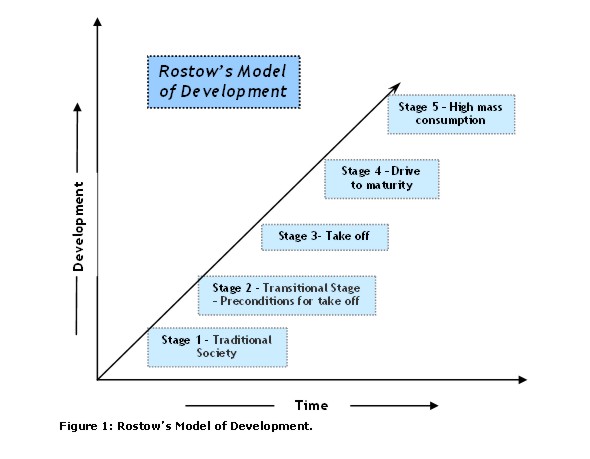
As you can visualise through the graph the metaphor of the aeroplane is pretty real, but this aeroplane can never be allowed to land for economic stagnation would be tantamount to political and financial suicide (hence the beauty of the Icarus metaphor). The overarching aim of Rostow's aim was to transform society into an industrial, liberalised society, in which the U.S. and Europe are the models for economic success. Rostow gave us the tools to grow, but he never answered the question of what to do next, when the "increase in real income loses its charm".
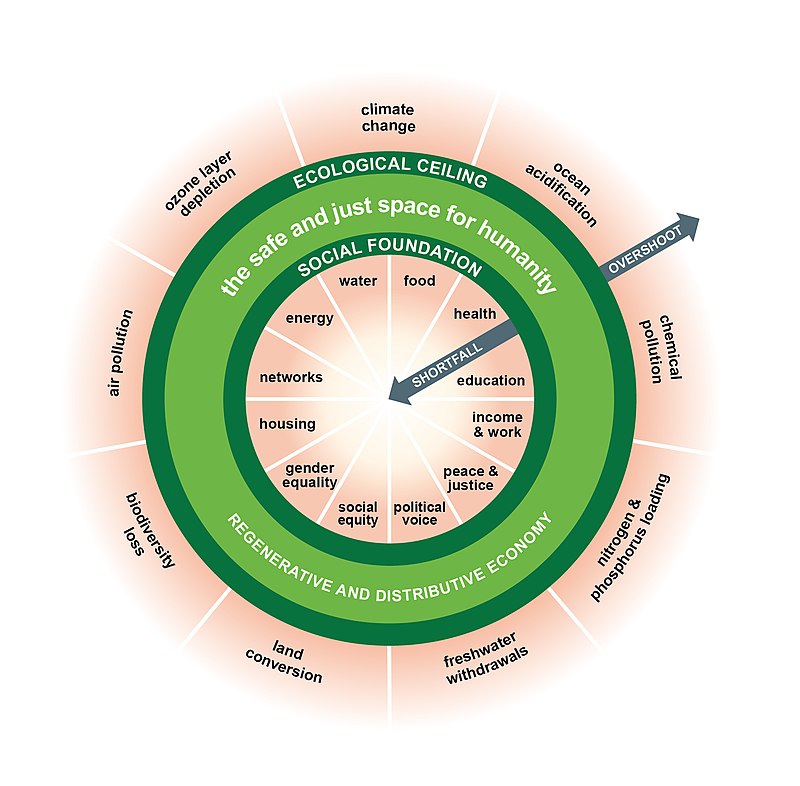
In looking forward to the future, please watch Kate Raworths Ted talk on doughnut economics, it is highly informative (a great proportion of this article is based on her talk) The framework of this economic model is that the needs of the people are adequately met without overshooting the ecological ceiling (climate change, biodiversity loss and so on). By redefining the definition of what it means for the economy to prosper, we can ensure every citizen's needs in health, education, food, access to water and such are met without destroying the ecosystem that we depend upon.
"No economist from the 20th Century saw this picture, so why would we imagine that their theories would be up for taking on its challenges. We need ideas of our own" ~ Kate Raworth.
No human in history has ever reached the level of safety, luxury and peace compared to ours. Amongst the digitalisation and excavation of our landscape, now is the time to think.
Culturally addicted.
Henceforth, here we are, financially, politically and socially addicted to growth. Companies are pressured to produce the highest rate of returns, the highest sales, market share and profits. Banks give out loans that must be paid back with ever-more interest. Politicians want to raise tax revenue without raising taxes for the populace, and the only way to do so is through more growth. A century of consumer propaganda has not helped us either, created by Sigmund Freud's nephew, Edward Bernays, considered the "Father of Public Relations", who utilised propaganda, crowd psychology and psychoanalysis to control the masses in desirable ways through retail therapy.
Edward Bernays sought to harness Freud's notion that we are driven by irrational forces, that by understanding the mind of the group, he could manipulate behaviour without us realising it. Such application of psychoanalysis came in the form of his infamous "Torches to Freedom" campaign, where for context, in the 1920s it was taboo for women to smoke in public as it was considered, corrupt and sexually permissive. In consultation with the American Tobacco Company, Bernays developed a campaign that equated smoking as challenging male power (cigarettes were considered symbolic of male power), and thus pitched the idea that expansion of rights could be achieved through women smoking in public places. In reality, women were no more free than if they did not undertake the right to smoke, but linking smoking to women's rights fostered a feeling of independence which was immensely successful in lining the pockets of Big Tobacco.

You may argue that while yes, mass consumerism and neoliberal capitalism has brought prosperity to billions of people, we still cannot ignore the social division that this addiction to growth has caused. The purpose of pursuing exponential growth rates was to ensure prosperity for the common people. However, widening income inequality has turned this upside down, where the vast share of returns to wealth is accrued mostly in those of the 1%. In September 2019, the U.S. Census Bureau reported income inequality to be the highest in 50 years, the Gini Index growing from 48.2 in 2017 to 48.5 in 2018, (Gini Index is a scale from 0-1, where 0 indicates perfect equality and 1 indicates perfect inequality). Moreover, the CEO to worker median wage gap rose from 604-1 in 2020 to 670-1 in 2021. I do not see this improving anytime soon unless the U.S. figures out how not to serve the interests of the Oligarchy.
Moreso, neither Australia is safe from rising income inequality. Rapidly rising housing prices and (the subsequent fall we shall observe in the future) continue to widen the gap between those who bought homes whilst they were affordable compared to those who cannot afford to purchase one. The report launched by UNSW and the Australian Council of Social Services reminds us that wealth in Australia is divided very unequally, with the 130+ billionaires in our country and last year their wealth grew by a mean of 12%, holding as much wealth as the bottom 30% of the Australian population. The report also highlights that between 2003 to 2021:
- homeownership among people aged 25 to 29 fell from 44 per cent to 38 per cent and among people aged 30-34 it fell from 57 per cent to 50 per cent
- the proportion of median household disposable income required to service a typical home mortgage rose from 27 per cent to 41 per cent
- the proportion of median household disposable income required to pay the median rent rose from 26 per cent to 31 per cent.
Along with a ridiculous 6.1% inflation in the June 2022 quarter due to the joke that is quantitative easing, it is so wrong that something as fundamental as housing could be so unaffordable to those of low to middle incomes.
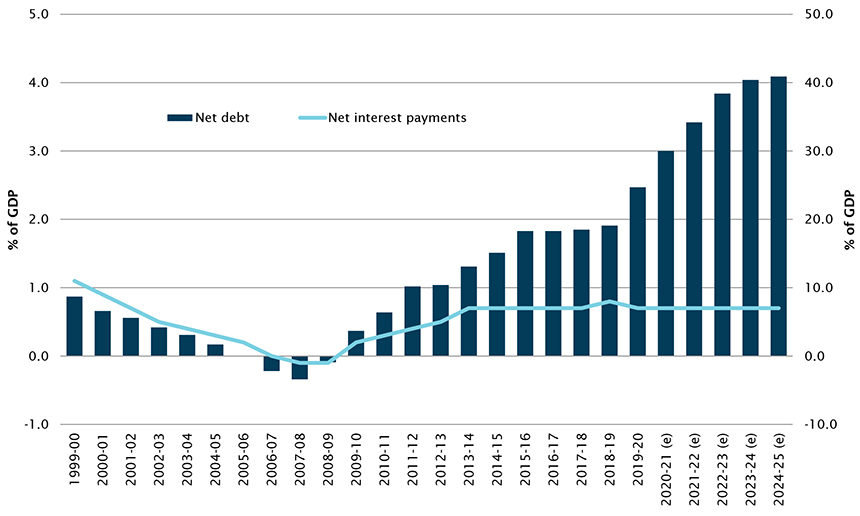
Consider above how toxic growth and debt can be. Money is borrowed by issuing government bonds, but these must be repaid by the government, and so what must the government do to repay? Increase growth, increase GDP such that they may be able to pay off this borrowed money. This creates a positive/negative reinforcement cycle (whichever way you look at it) that makes the debt extremely difficult to pay off, if at all. Now consider the $28.43 trillion in U.S. federal debt..... (hint: it will never be paid off, unless more growth😞??) This is what I like to call the "curse of GDP", a system that relies on unrivalled economic growth as a measure of progress will be cursed to extract and extract until it can no more, and inevitably stagnates...
A thought experiment on Usury, could elimination of interest rates be a possible step?
Interest rates are fundamental to how our financial systems operate. But in the past, the charging of interest (usury) was considered for religious purposes to be unethical, where the act of giving a loan and asking for more in the form of interest was considered to be illegal and immoral such as selling a loaf of bread and charging for it. When I think of usury my mind is immediately reminded by Shakespeare's Merchant of Venice, where Shylock, the principal antagonist, is a Jewish moneylender in a Christian-dominant Venice. However, in modern times, it is not only the Jewish but everyone including the Christian on this earth that utilises interest rates. To apply this in modernity, it is essential to take a look at interest rates from sustainability and economic perspective rather than a religious one.
In finance, the first thing we study is the Time Value of Money, where we discount future cashflows, the concept that money now is worth more than in the future (derived partly from interest rates). Though rational in a sense, it has disastrous implications for how fast we deplete our resources. By discounting the future and focusing on the Net Present Value of our investments, we are guided to maximise the utility of present generations rather than future generations. This concept is antithetical to our goals and traditional owners of the land's ideals of sustainability, to preserve the future rather than the present is counter to that which the interest rates incentivise you to act.

Interest, as you should have guessed, is also inherently unnatural. When you deposit money in the bank for 5% interest compound p.a. where does this money come from? From the expansion and depletion of further resources, the conquest and colonisation of other lands, the continuous lending of loans. Now consider: Nature is regenerative. If you left this year's apple or pear crop on the tree it would not be compounded heavier the next year! Therefore, nature cannot feasibly support the concept of compounded interest rates for its regenerative capabilities are far inferior. Take the example of Judas, if Judas had invested his 30 pieces of silver after he betrayed Jesus at 2-3% compounded annually, how much would it be equivalent to today? Probably the weight of all the silver on this earth.

Now, do you see why something as simple as interest rates could be the bane of our existence? The concept of the Time Value of Money and discounting future cashflows abhorrently violates the presumption of our traditional landowners, that the land of the present should be handed over to the future generations. Therefore, I expose the deception of the fundamental factor upon which our growth-addicted economy is based: a shameful device that robs children of their future.
The monetisation and decline of our education
This is partly an anecdotal piece, but I consider it to be quite accurate at least for Australia and the U.S.
This is quite an unprecedented time we are living in (unprecedented gets used a lot by news media sorry). The complexities and history of the university sector across the western democracies have led to a) a surge in the increase of tuition fees and b) a loss in the purpose of education.
In Australian secondary education, in particular, there is a significant political motivation for the concept of "teacher quality", where we place significant emphasis on the individual teacher rather than collective or systemic issues in our education system.
The focus of "teacher quality" is a term used by politicians to draw our attention away from solving systemic issues such as teachers being overworked, underpaid or teachers having to work outside their field/in their own time. In symbiosis with the emphasis on teacher quality, teacher bashing has been normalised in Australia, with 8/10 reasons why a student does poorly being due to the teacher allocated to the classroom (hint: the teacher is poor because the system is just as poor) (also hence the strikes)
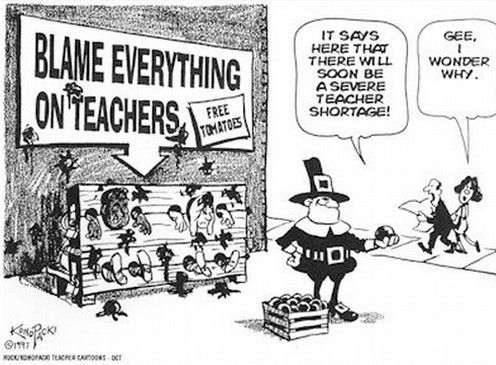
In relation to a), tuition has become insanely expensive, especially in the U.S. and the western democracies (remember, any declines in the U.S. have an impact on us), due to the commercialisation of education. University administrators and trustees have figured out how to raise the bar to how much people are willing to pay. Combine this with cheap, government subsidised loans and competition for limited space by wealthy international students and you have a bottomless money pit in which the student loans (in the U.S) have none of the standard consumer protections afforded to every other loan (you cannot default on student loan debt :/).
Similarly, remember how in 2020 (my graduating year sadly), the government raised its fees for everything except STEM, Medicine and "practical" degrees? Obviously, this is a rational attitude by the government to increase participation in the STEM field which do statistically earn more on average. However, I have noticed in personal experience that this obsession with degrees and their predicted earnings has plagued how we approach education. School students and university students alike are now basing what they want to learn based on monetary value rather than "useless" liberal arts degrees.
Until the beginning of this year, I had held a similar attitude to this and I realise how damaging it could have been had it not been for my wiser judgement. Under the illusion of expanding their options, students are incentivised not by an interest in the subject but by the monetary gain to pursue taking "pragmatic" subjects such as Extension 2 Maths, engineering, business studies etc in hopes it will increase their ability to take STEM in university even if they were ill-suited for it in the first place.
Remember how we talked about how GDP is an inaccurate measure of economic progress? Well so is basing your higher education decisions based on how much you could earn in the future. While the humanities and arts clearly do not provide measurable economic value, the intrinsic value contributed to society through the exploration of the philosophies, morals, politics and social sciences can hardly be measured.

It is arguable the net benefit of positive societal development contributed by the flourishing of the arts is far greater than that STEM. Consider if we had a flourishing culture of art, music and philosophy (if we funded and valued them properly), even from an economic standpoint. This sort of romanticist idealist culture would encourage foreign tourism through its vibrancy, uniqueness and creativity to otherwise obscure places in Australia per se, thereby boosting our economy and national identity. It would also increase national happiness and possibly lower suicide rates leading to more productive workers and less social disruption, meaning fewer expenses on crime prevention. This type of contribution is nearly immeasurable, and so to de-prioritise and belittle the humanities is inherently flawed, every culture and nation must value its civics, philosophy and laws or else it declines inevitably as it pursues hedonistic and monetary interests.
It was luxuries like air conditioning that brought down the Roman Empire. With airconditioning their windows were shut, they couldn't hear the barbarians coming.
Moreover, to label people who pursue degrees in fields such as history, archaeology and anthropology as stupid off the basis of projected earnings is the height of tomfoolery. A society that is not interested in the history and study of previously fallen civilisations will once more too, face the same fate as they (without a doubt) will face similar social and systemic issues that plagued the civilisation before them.
The decline of many empires around the globe can be (though slightly historically inaccurate) generalised to a recurring theme of decadence. With success, glory and prosperity come the arrogance of the people. Arrogance begets complacency which promotes bureaucracy that fosters corruption (🥱scomo and his 5 ministers) which is fed by limitless avarice (greed), resulting in widening injustice and inequality. The complacency of the people ensures they turn a blind eye to corruption until it is too late, and the enemy is already at the doorstep. This, therefore, creates a vicious cycle that becomes a downward spiral for such an empire. Now, what could be more obvious of decadence than a society that only seeks to enrich itself, not always by choice but through a need for survival driven by inequality that occurred through complacency in the first place?

*if you are interested in studying the rise and fall of civilisations see: "The fate of empires and search for survival" by John Bagot Glubb and "The Changing World Order" by Ray Dalio.
A special shoutout to the TikTok channel @education.forum who is in my view, the quintessential rational fool. His entire page consists of berating every degree except STEM or that which makes $$. Have a look for yourself, come reach your own conclusions :)


Following on I believe it to be rationally considerate to observe STEM and the humanities in the academic space to be of equal importance. Without flourishing humanity, there is little to prevent malicious minds from utilising the fruits of our research for personal use.
The philosophers have only interpreted the world, in various ways. The point is to change it". ~Karl Marx.
Though in contrast (as you can observe through the failed leftist projects of the 20th Century) to the words of Marx, I believe we are at a stage where we must first interpret the world rather than change it. To spearhead the advancement of STEM whilst viewing the world from our 20th Century, neoliberal/whatever amalgamation of ideologist type of lens is idiocy beyond my comprehension and so now is the time to take a seat and think about our future and existence.
If there is nothing else you get from this article remember this:
- The lens in which we perceive the world is at best, outdated, and so you must have the humility to recognise that the views you hold are likely narrow in scope.
- Recognise that current economic ideology is often symbolic of mass consumerist propaganda (quite evident when studying macroeconomics)
Many thanks,
kn.ch